Blogs
A most serious matter has been brought to my attention - at dawn today, human remains were discovered in the forest of Versailles, not far from his Majesty's hunting lodge.
The death is not viewed as suspicious, although the body seems to have been put upon by wild animals and ravaged!
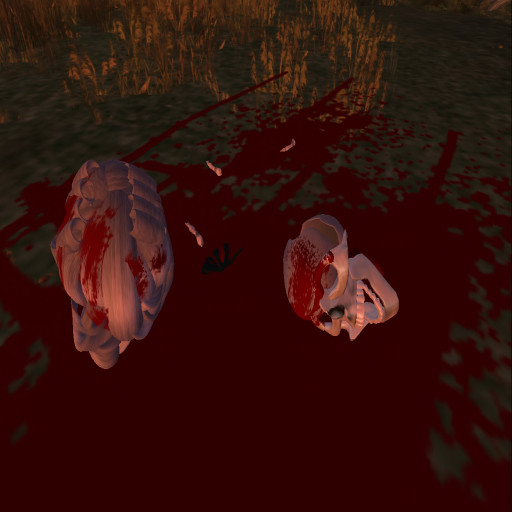
His Majesty is evidently most concerned about the welfare of his people, and at his lever this morning requested for me to contact all and sundry to make them aware of events, which I have done hence with all due haste.
Courtiers, beware! Be on your guard for any marauding beasts in the darkness of the forest.
Je vous prie d'agrer, Mesdames et Messieurs, l'expression de mes respectueux hommages,
Jean-Bndicte de Dampierre,
Prince de Carpgne et Grand Chamberllan du Roi
Footnote to the Story of Latude: the "Lettres de Cachet" or Sovereign's Sealed Letters
By Lord Myron de Verne, 2010-10-20

France was ruled in 18 th century by an absolute Monarchy: it means all powers ( including the judicial power) were united in the hands of the King, who held them by a decree of the Divine Providence: it therefore could not be discussed, disputed or contested.
Of course, the king could not rule alone a country of 30 million inhabitants: so, for instance in the judicial field, he delegated his power to Parliaments ( which were not Parliaments according to our present day meaning, but Courts of Justice), the big one in Paris, and several others in different regions).
So there were, in French law, two kinds of Justice, the Justice Dlgue( Justice delegated to the Parliaments), and the Justice Retenue ( Withheld Justice) : the latter term meaning the King could in many circumstances decide not to delegate his judicial power to the Parliament, but to exercise it himself directly.
The usual legal tool for this Withheld Justice was the Lettre de Cachet. It was a sealed letter, signed by the King, giving an order, mainly to jail someone. The letter was the sentence and its order of execution, and the royal sentence, being final, needed no motives nor explanation.
They were of two sorts : les Lettres de Grand Cachet, and les Lettres de Petit Cachet.
-Les lettres de Grand Cachet : These were decisions of the King himself, by his own will. It concerned mostly political issues, as in the case of Voltaire and Diderot, who were jailed in La Bastille. It could also concern some lesser characters, when the king thought a public trial by the Parliament could be a nuisance to himself or his relatives, or favorites, or cause a scandal in the Court. They were also a mean of avoiding to have a case judged by the Parliaments, which were often in conflict with the King, and could sentence differently than the King would have wanted them to. (Latude was a typical example of this use of the Sovereign's Sealed Letters).
-les Lettres de Petit Cachet: By far, the most frequent use of the Lettres de Cachet, they were signed by the King at the request of individuals: they could not concern crimes, but only lesser offences.
They were most of the time requested for private affairs, by Nobles or Rich plaintiffs, who intended to protect their family name from a public scandal.
5 categories of offences could lead to a Lettre de Petit Cachet:
-Madness or Irresponsible behavior
-Excess of Youth
-Libertinism
-Unbalanced Marriage( mostly between nobles and the people)
-more serious offences.
The consequences were:
-Unlimited detention in case of madness or insanity
-One or two years in jail in case of libertinism or debauchery,etc
- More important sentences for violent offences, or offences who would have dishonored the Families if a Court had judged them.
To ask for a Lettre de petit Cachet, the process was as followed: A family or individual would file a request at the Bureau des Placets, opened daily in Paris. In case of a public scandal, the request may be filed by the local priest , or bishop, or Landlord. Then an investigation is led by the Police, checking two main points: are the facts mentioned in the request real and true? Can the applicant, family or individual, pay for the expenses of the jail?( when one asked for a Lettre de petit cachet, one had to pay for the prison expenses for all the duration of detention). In case of a Lettre de Grand Cachet, the Royal Treasure paid for the State Prisoners expenses.
( for instance, Latude had the status of a prisoner of State, having been jailed by a Lettre de Grand Cachet, and all expenses were paid by the Royal Treasure. On the other hand, examples of prisoners by Lettres de Petit Cachet were the Comte de Mirabeau, jailed in Jura because he was about to ruin himself and his family with debts and libertinism, and Marquis de Sade well, in this case, you know whytheir families paid for the prison costs).
Even if it was statistically marginal, this practice of Lettres de Cachet was immensely unpopular by the end of 18 th century: The Philosophers had compared the Law in England and France on this matter, and claimed for the adoption of the British HABEAS CORPUS in French Law ; the King never accepted to abdicate this power of his. This showed two conceptions of Sovereignty and Law ,too far apart to compromise, and announced the revolutionary clash.
( the illustration on top of this footnote is a "Lettre de cachet" signed by Louis XV)

He is known ( a little) in History as LATUDE, but was born Jean HENRY ( such a common name !) in 1725, in the small village of Montagnac in Languedoc, from an unknown father.
His mother belonged to the small provincial Bourgoisie, and raised him alone, trying to provide this young, ardent, imaginative, presumptuous and undisciplined child with the best possible education, but her best was not enough.
At age 17, he enrolls as a Garon Chirurgien ( Surgeon Assistant) in the French Army, when the War of Austrian Succession storms all over Europe. He shaves beards and pulls teeth between the battles, and after victories or defeats, holds the wounded during amputations, or carries the dead to the common grave. He dreamt of a glorious or at least enviable destiny, and this one is certainly not compliant with his chimera.
When the war is over, he resigns, and his relentless ambition calls him to Paris , the center of the world, and the City of all opportunities: he changes his name for the first time, in Jean Danry, and is flabbergasted by the hectic life of the French Capital, and by the Parisiennes. His hopes for opportunities to earn a fortune without working are disappointed though, and the spare money he kept from his Army years soon runs short. He has to find an idea soon.
At the same time, the rumor spreads through Versailles and Paris of a great conflict between Madame de Pompadour, Louis XV s favorite, and the Comte de Maurepas, Minister of State, and Chancellor of the Royal Treasure. Madame de Pompadour convinces the king to dismiss Monsieur de Maurepas, and it causes an uproar at the Royal Court.
Jean Henry or Danrys time has come: he gets the idea of having a parcel delivered to la Marquise de Pompadour, and this gift contains a bomb of his own making. A miserable, inefficient bomb, but actually his idea is to warn the Versailles Security before the parcel reaches the Marquise, and therefore to attract attention on himself, and appear as the savior of the Favorite. He hopes a reward, and who knows? a pension, or a place in Versailles.
But things turn otherwise: he is suspected ( the Security had him writing down his testimony of the facts , and his handwriting is very much the same as the one on the parcel), the Pompadour harasses the King to discover who plotted against her behind the scenes, the opposing party rages against the PompadourThe King senses that if he lets the Parliament ( name of the Court of Justice) deal with this affair, as ordinarily he should, the scandal will go on and on, and grow up and up: he decides to sign a lettre de cachet, which is an order to lock Danry in the State Prison of La Bastille, at the eastern border of Paris, without any trial . This is much more discreet! We are in 1749, Danry is 24 years old.
He is set on the grill ( metaphorically) there, by investigators, to reveal who are his sponsors and accomplices in this plot: of course, he says nothing, since theres nothing to say! Time passes, other plots or intrigues happen in Versailles, the interest in his case fades awayHe is transferred to another jail, the Dungeon of Vincennes: this prison is looser than la Bastille: he can walk in the yards, meet the other prisonersHe soon begins to court his jailers daughter, who brings back , every Sunday, the laundry of prisoners who can afford to have their linens washed and ironed.
They chat and flirt in the main courtyard of Vincennes, and the girls dog barks and plays around them.
Danry-Latude throws a twig to the dog, the dog brings it back; he throws it again further, and it hits a small door in the Prison wall: the dog rushes to this place, and catching the twigswings the door opened! It wasnt locked!
So Danry, quietly, without running, escapes and disappears in the streets.
A few days later, wandering at loss in the streets of Paris, he comes back in the Vincennes vicinity, and is caught. Back to Bastille!
This time he is more severely locked in, with another prisoner: soon, the two jailpartners manufacture a rope ladder, out of logs for their fireplace, and threads from sheets and clothes. After six years , it is ready, and they escape again! A sensation! it never had happen before in La Bastille!

( engraving of La Bastille Prison during the 18th century)
Danry-Latude crosses the border and takes refuge in the Netherlands: after six months, he is captured again, and sent back to La Bastille: this second escape aggravates his case, so he is thrown alone in an isolated jail, deeper, damper, and filthier than the former ones.
He lives there in the sole company of rats, and, sharing his daily food with them, tries to tame them, giving them first names, and pretending he is their new kingHe also begins to write letters to all the influent and mighty people of Versailles, Paris, Nobles, members of the Parliament, writers, religious dignitaries, intending to attract their attention on the unfair and desperate situation he has been unjustly thrown in. He flatters them most of the times, and sometimes, as no answer is coming, he threats. Irritated by the lack of reactions to his pleas, he writes more and more letters, giving advices on how the kingdom should be governed. He signs these letters Masers de Latude: its more chic! He will now be known as Latude.
After the death of Madame de Pompadour in 1764, he is transferred again in Vincennes, to alleviate his pains. There again, he can walk outside, even out the prison itself, on the strict condition to be accompanied by a guard. One day, as he walks side by side with his warden in the streets of Vincennes, a thick fog suddenly wraps them.What do you think of the weather?asks Latude.
-Methinks its bad says the soldier
-Methinks its good, answers Latude, - for an escape, at least! By-ye!.
Once free, he naively, stupidly or madly goes on writing letters here and there, asking for protection, demanding indemnities for his unjust imprisonment, detailing wondrous fanciful political projectsand of course is trapped again. Back to Vincennes.
In 1775, the Minister Malesherbes, visiting the state jails, meets Latude, and convinced the latter is plain insane, has him sent him to Charenton, an asylum. Two years after, he is released, but obliged to stay out of Paris. He doesnt, and is soon accused of extorsion, and sent first to the Jail of Le Chatelet, and next to the asylum of Bicetre. Latude gets sick, catching scurvy, but goes on writing letters, and his biography.

(Latude's escape rope ladder)
Finally, he is freed in 1784, having spent 35 years in jail WITHOUT ANY TRIAL, and having escaped six (or seven?) times. He then has his book, Despotism Unveiled, or the Memoirs of Henri Masers de Latude, jailed for 35 years in different State Prisons, published in 1787 in the Netherlands ( to avoid French censorship).
He suddenly becomes the talk of the town, the toast of the Enlightened, and the darling of Society Ladies: times have changed. The monarchy is exhausted , needs reforms which the undecided King is unable to promote against the opposing lobbies, the enlightened ideas are gaining the ground the absolute monarchy is yielding, and the word Revolution, blossoming on many lips, is not anymore taboo; besides, the overall mood of the day is clearly pre-romantic, and many Nobles and Bourgeois shed a tear on the ill fate of this poor victim of despotism. Some of them begin to sponsor Latude, for the first time in his life.
But the best , for him, is yet to come: on the 14 th of July 1789, the Bastille is assaulted by the people of Paris, its the starting day of the French Revolution. Latude goes there immediately, and grabs, before the Bastille is demolished, his escape ladder that had been kept there for 28 years(this same ladder can still be seen nowadays in the Paris History Museum, Muse Carnavalet).
In his old days he becomes a hero of the people, a legend, a symbol of the victims of false arrests and Royal Arbitrary: he is awarded a life-time pension by the Convention( political Parliament of the Revolution), and every Lady with a Salon definitely wants him at her Dinner Parties! Day after day, year after year, he is asked again and again to tell about his escapes, and oh my, does he like it!
The Duchesse dAbrants invites him one evening and writes in her Memoires : Lorsquil arriva, je fus au devant de lui avec un respect et un attendrissement vraiment difiants. Je le pris par la main, je le conduisis un fauteuil, je lui mis un coussin sous les pieds ; enfin, il aurait t mon grand-pre que je ne laurais pas mieux trait. A table, je le mis ma droite. But the charm soon dissipates , and she adds : Il ne parlait que de ses aventures, et avec une loquacit effrayante. To sum it up, he is a self assured bore.
He has his final escape, without return, on January, the first 1805. I like to imagine him on the threshold of Heaven, anxiously looking at St Peters bunch of keys, and wondering if Hes not one more jailer
Thus ends the story of an otherwise unremarkable fellow whose remarkable destiny illustrated one of the aspects of Justice in 18 th Century. If you are interested in more legal details , read the footnote to be published separately
.

(Donjeon de Vincennes, former Latude's prison)
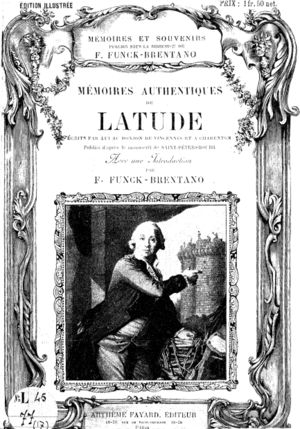 For months , I nurtured the idea of telling stories of lesser known French 18th Century characters and facts: I thought it could be a lively way to shed some light on everyday life in those days.
For months , I nurtured the idea of telling stories of lesser known French 18th Century characters and facts: I thought it could be a lively way to shed some light on everyday life in those days.
Alas, I had not realised what a time-consuming task it was: documenting, building a synopsis, and writing it in English, which is not so natural to me, as you'll soon discover ( please purists, accept my apologies!).
So I had nearly abandoned this too heavy project( I'm busy most of the time, and lazy for the rest...). Then I read here the excellent portrayals of Royal Court Personalities by Melle de Milneaux, and she gave me the start and courage to go back to my desk.
So let me dedicate this first story of a series to Marie- Therese de Milneaux.
The first story you will be able to read here very soon, will be titled:
"LATUDE, or 35 years in jail without a trial, and seven escapes"
It will be followed next month by the story of an even more fascinating character!
In Japan, my family were kuge, nobility of high enough rank to serve the emperor directly. Naturally, Takurou did not expect to be given high rank immediately in a foriegn land, but we hope to earn a rank that fits with our high rank in Japan. Takurou started here in France with his family and household by first selling some of the exotic ceramic wares and the like, the kind Westerners pay such dear prices for from Dutch traders. The family bought some land near Sevre, and began a silk producing workshop since several of the female attendants had brought mulberry leaves and silkworms, as would any sericulturalist worth her salt.
Over the generations, the Nakamura silk business propered and made quite a fortune. Over time, the group of exiles naturally married French brides, though a main line that maintained the Nakamura name remained in charge of the business. In appearance, they became more and more hybridized, though still tending to black hair and brown eyes. Family traditions of naming were to give both a Japanese birth name and French baptismal name. My two names are Satoharu Nakamura and Sophie Marie Nakamura.
I was born in this country, and grew up speaking mainly French, though I learned some Japanese, mostly to appreciate poetry suitable for a young lady. My aunt manages the estate when Father is off at court or inspecting the silk production. There wasn't anyone for her to marry at her age. Grandfather died when I was a little girl, but Grandmother still lives in the family home. Auntie tends to her. As for me, Father would like me to marry a good man of higher rank than Baron, so that his line would attain a rank equitable to what was once had in Japan.
My mother was the sole heir of an impoverished Baron who wanted the large dowry that Father promised. In return, his title passed to Kazamitsu (brilliance of spirit) Nakamura, now Baron Nakamura.
To the reader of my diary on a day long from my day, I enter these words. In a time when a woman could not inherit, own, or even earn her own keep, a thought for you...A courtesan is not born but made.
Perhaps you wonder why I have been made.
Having just retired from a very private dinner with a great nobleman, and picking small pieces of vegetables from places they ought not be, I am thinking upon my guest's surprise and glee, as I was being carried into the dining room amidst much herald and fanfare to be served as his main course. Beautiful and sinfully clad as a feathered peacock, upon a golden platter laid I. Smiling wickedly remembering this thought, in which, his Grace, the Duc, could not wait to....unfeathered me. Gasping now, you are probably no doubt!
It is said in Versailles, that gutter girls know their jewels. As the grateful Duc for his sensual meal, bestowed upon me Diamonds, Sapphires, and Pearls. For which with no fakeness nor paste, or artifice, that could be found by me.
Lounging upon my pillowed chaise, as I wait for my servants to complete their task of pouring bottle after bottle of pink champagne, which is such a delicious indulgence for a woman's skin, into my ornate custom made silver bathing tub. My champagne is endless, which the monks send faithfully each month for an exorbitant fee. Such a luxury you sneer, but just every day life for me.
My mind begins to wander back to my beginning, as I was not always so wanton a courtesan be. I was not born to rank, great wealth, or privilege, my how things have changed! At a very tender age, I was sent to a convent, without a second thought of me. My new mother felt I was a unnecessary bother and a reminder of his marriage passed. She wished my father to form an attachment to her daughters and son, what an ill behaving lot of runts they were. The education and decorum I learned at the convent, at first was not appreciated by me, as I rebelled with every step and lesson taught to me. Bitterly recalling that the nuns were quite strict and quick with a slap or a stick. At a time when a child would long for her mother, I longed for freedom for me. As with everything time does pass. The gosling of a girl grew into a beautiful swan. Laughing now, remembers that I was always paying penance for the beauty I possessed, as beauty, to quote the priest, is vanity at its best and a scorn to a woman borne. Languidly stretching is she, I would say I received quite the education, having learned excellent manners, which would later help in my attraction of wealthy men to me. In the vegetable garden I learned more than gardening. It was there that I received my first kiss from a visiting nobleman experiencing the power of attraction of beauty for me. A day was soon upon me, that I would never forget and forever change the events of me. I was ushered into the presence of the mother superior. I knew naught for what. I was told that my father had died and that a decision was required from me as to becoming a nun or being turned out, as funds will no longer be forth coming for me. Which is what they really cared about, the money, not me. I was not allowed time to grieve or to think, as an answer was immediately demanded from me. Since I felt no inclination toward being a bride of Christ, imagine that, and more of a leaning towards being a mistress of sin. I once seen a fabled creature at mass, richly garbed and bejeweled, she rolls her eyes, and insulted by the good women there, we were instructed not to look upon her by the nuns who took us there.
With only my innocence, yes it was still in tact, my meager possessions, and the clothes on my back, for it is for no wonder and I have never looked back, as I set out for Paris and the history of me.
I am the whispering behind the corner
I am the wall that has ears and eyes
I am the shadow behind you
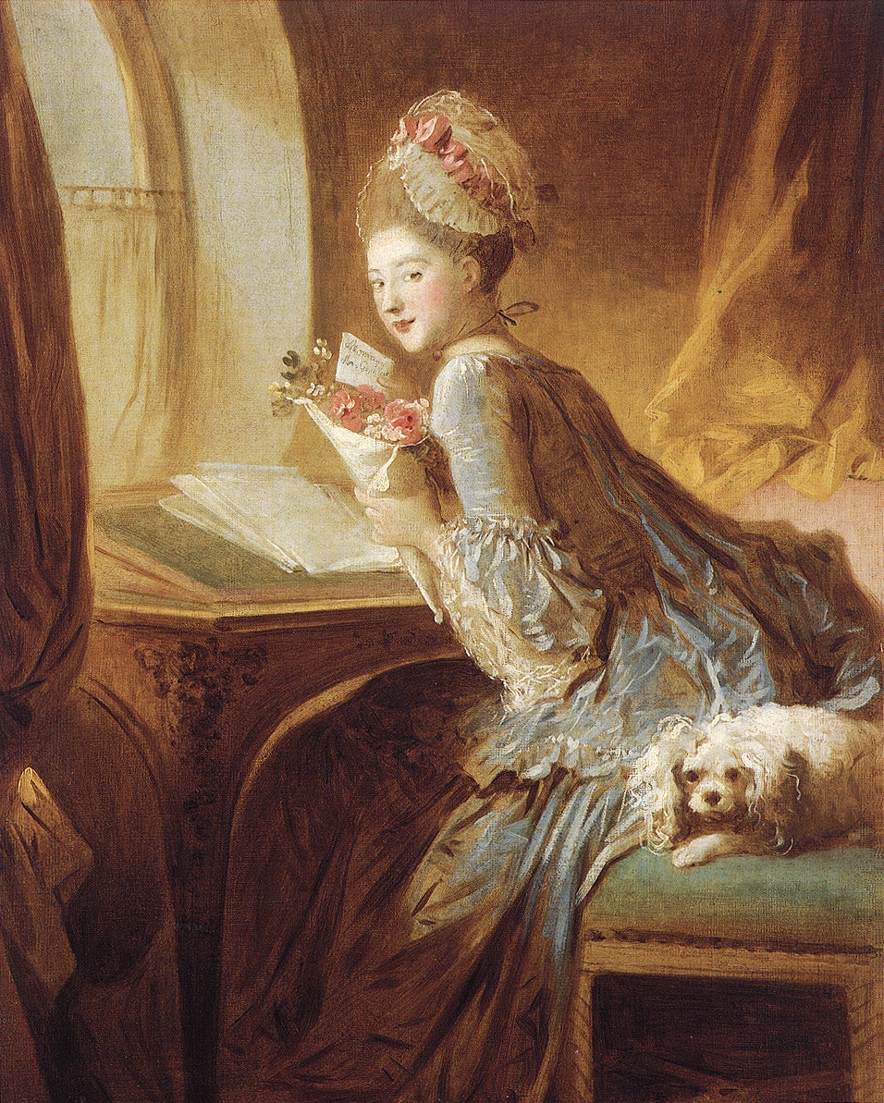
With all these ghost stories and strange appearances in the Duchy... It may be necessary to tell about what Stormy and I discovered a few days ago. At first, I didn't wanted to mention it, but maybe now it might save some lives...
A few days ago we enjoyed a walk through our beloved Duchy, and ended up at Touraine Coeur Est, where we discovered an old graveyard.. We went in to enjoy the tranquility there... after a hard day of work...
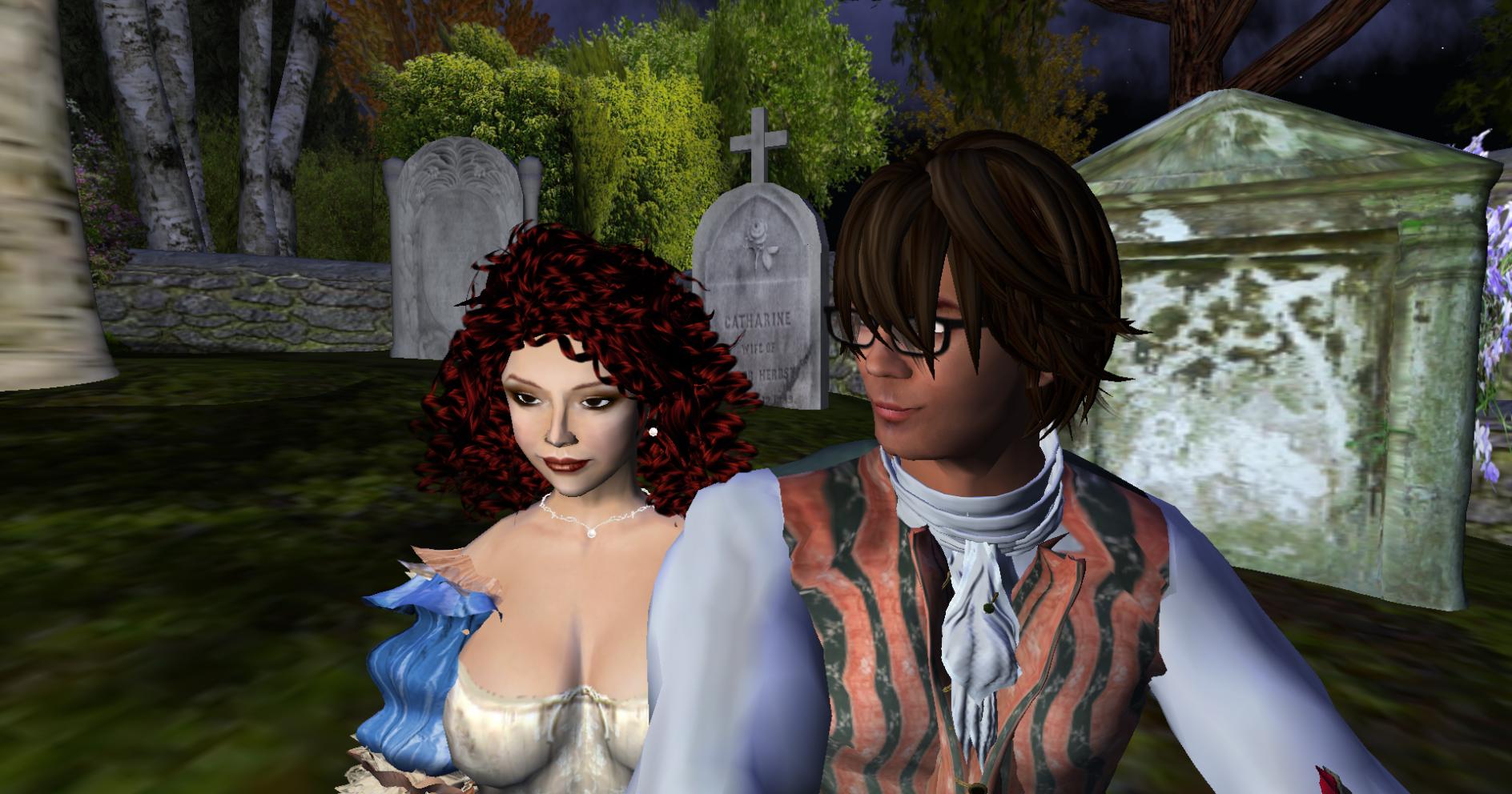
As you know us, you are already aware that we only have eyes for each other, but somehow we suddenly noticed strange but beautiful apparitions. We started following them, but we could not stop feeling that someone or something was watching us....

Oh horror, Stormy and I stumbled upon this OPEN grave!!! (Fortunately, I caught her before she actually fell in.)
What could this mean? Grave robbers? Vandals? Or...???
Some horrifying thought struck us... what if this was the resting place of that Ghostly Creature we witnessed at the Opera house a few days ago???
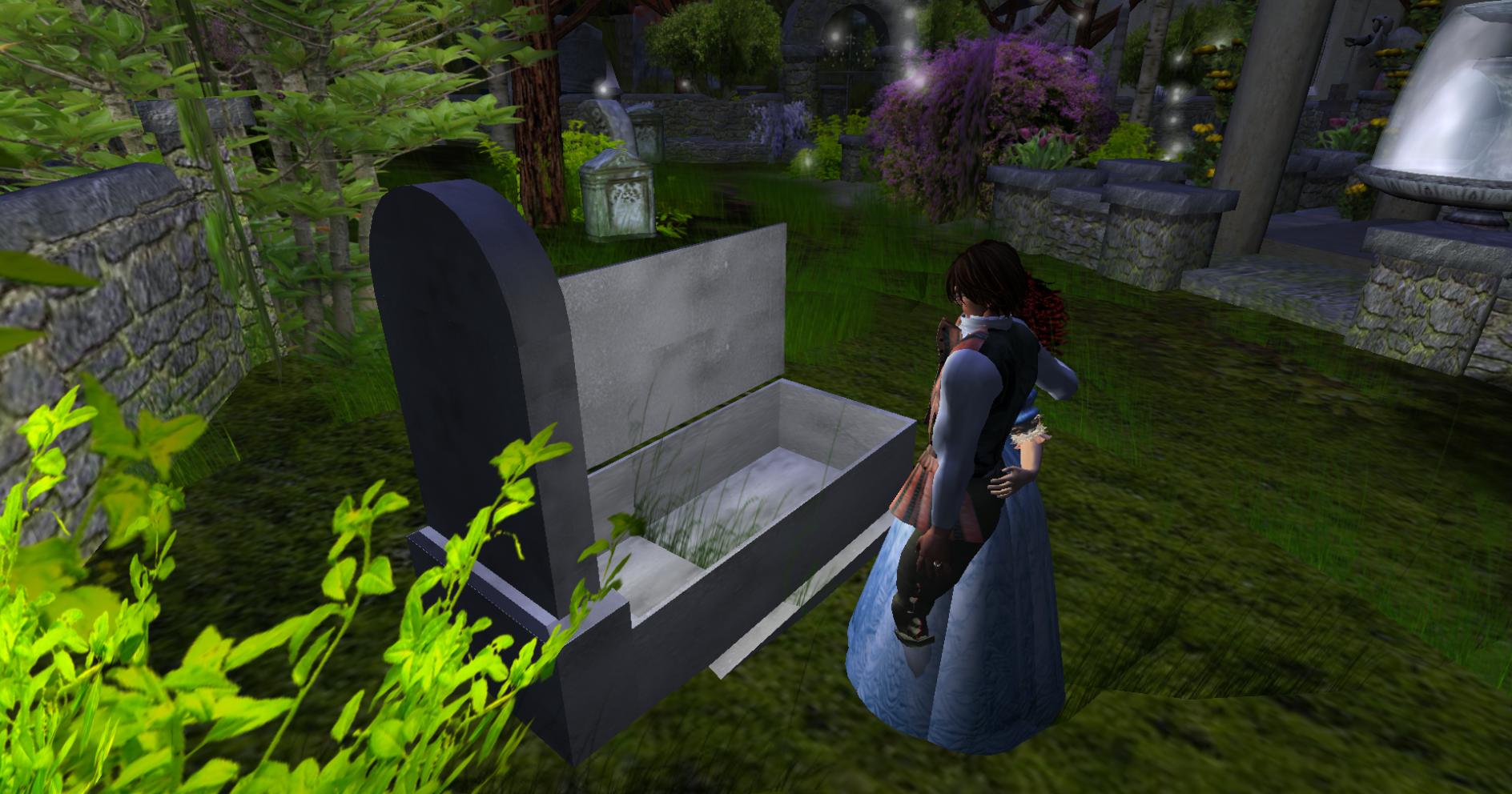
What mystery hides in this old graveyard? What terrifying events have taken place at the Duchy in the past?
Who's restless soul is coming to haunt us? We wondered who this grieving lady might be, and who had left the fresh flowers here on this grave. The tombstone bore no name .....I had the feeling she was crying. A teardrop rolled down... or was it just dew?
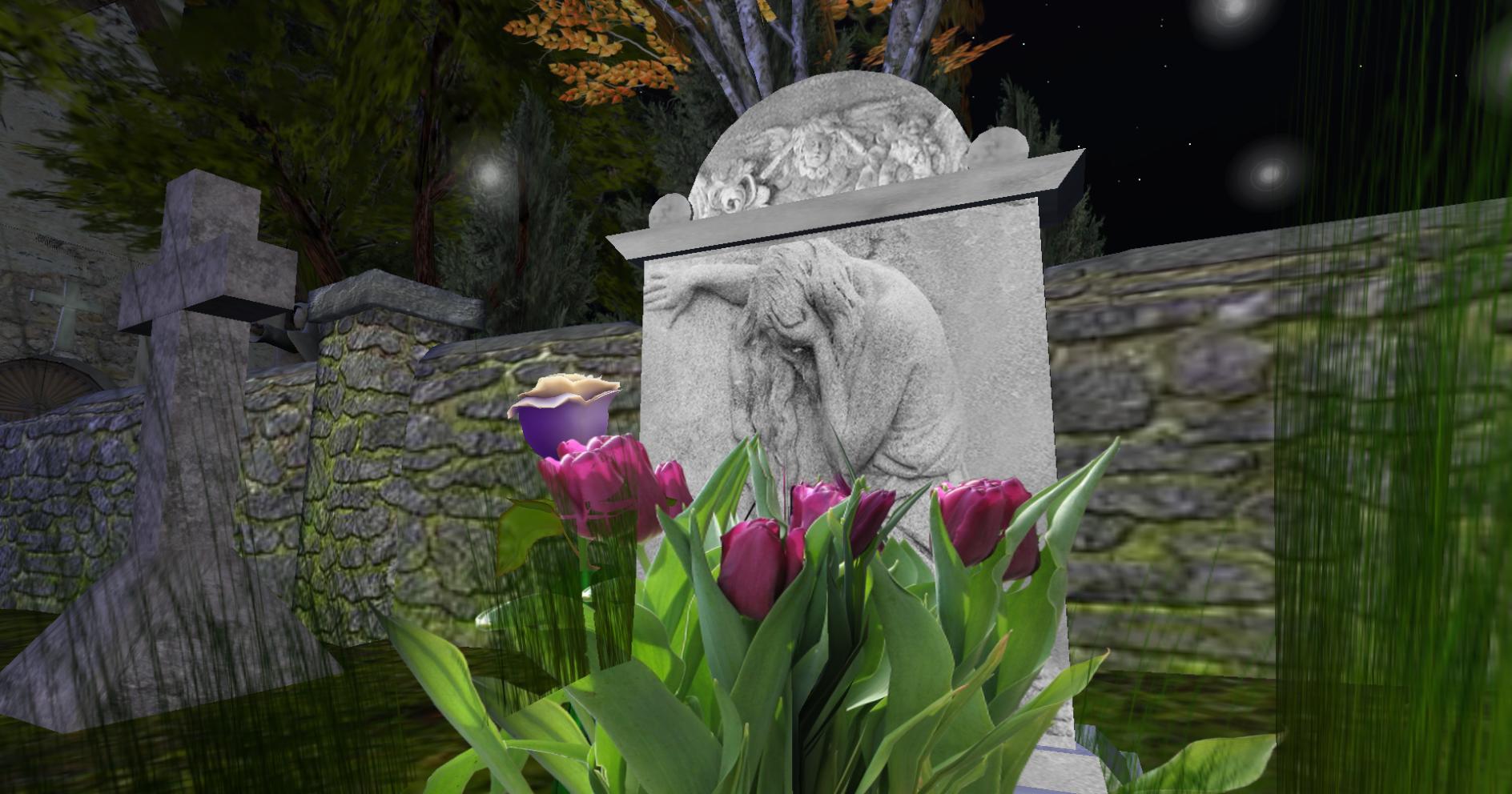
We went back home... But i could not sleep that night... I couldn't escape the feeling a bad moon is rising...
Dr. Pekel Panacek, Chirurgien de Coeur.
But none of these steps was effective! The latest night, while I was standing in the balcony of my painting study, enjoying of the fresh night atmosphere, I had a terrific vision that I will need long time to recover from it.
This are a little drawing about the ente that I met, and from which I continue hearing his spectral and terrible voice...

Because he talked to me. He knew me because He said that in fact is a future ghost form one of the members of our community, and he back to our time to save his living self from I dont know what terrible facts that are going to ocurr...if he cannot avoid it.
He talked me about a murder, and his purpose last night was avoid that myself met his living self...I dont know why and none name was pronounced by him, so my disconcert is total about it!
Someone could help me? One of our friends could be in danger and need our help, or may be that someone put in my pipe something more than tobacco?
I just left my house, when I heared a horse that galloped towards me in the other direction. You can imagine how was my surprise when I saw that noone was riding in this horse, and that, in fact - this dont was a horse.
When the creature reached my side I could contemplate, astonished, the incredible fact that it was a real unicorn, like the ones that we can find in the bestiaries and these other rare books filled of phantastic and legendary creatures!
I followed the beautiful and extraordinary creature in its gallop, and when I reached it, - and this is more incredible yet - the unicorn talked to me.
I promise you that I did not drink nothing this morning, and myself had to pinch me to know that I was not dreaming.
About the words that the unicorn said, I fear that I'm not authorized to tell you, because I dont want to betray the trust that this magical creature gave me.
Only advise you about there are extrange things around the Duchy and you must be well prepared if you meet some of these magical creatures, because could be that not all be as charm and beautiful unicorn that I have the pleasure to meet.

